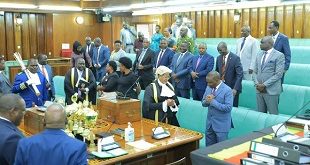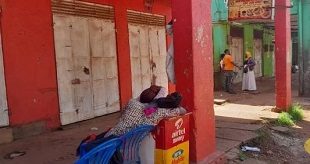
Kampala, Uganda | THE INDEPENDENT | The recent spiraling in fuel prices in Uganda has been attributed to the need to ration the available fuel stocks rather than profiteering.
Fuel prices have been rising sharply since late last year but since the beginning of this month, they have risen more sharply by up to 1,300 shillings per litre. In some places around Kampala, prices went up to 5,700 shillings for petrol and 4,400 for diesel per litre by Saturday.
This was attributed to a slowdown in supply as truck drivers at the Malaba and Busia border points parked their trucks protesting new Covid-19 testing guidelines. They were reversed last week and by Wednesday, testing on the drivers was being done at no cost.
In a government statement issued on Friday, the Ministry of Energy said the demand for fuel had been increasing even before the strike by truckers.
This according to the statement, was due to the fact that the economy was recovering and the rise in activities meant more demand for petroleum products.
On Saturday, there was also a hitch at Malaba border-post when the cargo scanners broke down, but by Sunday morning, the system had been restored according to Uganda Revenue Authority.
Malaba cargo scanner is up and running after a technical incidence yesterday that caused public concern. A mobile scanner was temporarily deployed as the Malaba team worked tirelessly to bring the stationed scanner online into operation,” said Ibrahim Bbosa, the URA Head of Public and Corporate Affairs.
By Saturday evening, URA says they had cleared almost 200 trucks, 82 of them at Busia alone.
Following the near-halt in deliveries, fuel stations started running dry, hence the high prices.
Fred Nairongo, the station manager at TotalEnergies Nakulabye says he is not sure when they will receive their next deliveries, adding that he expects to run out of stock later on Sunday.
He hopes however that by the end of this week, the situation will improve if the trucks arrive within the week.
However, his counterpart Denis Acuka, the Manager at Rubis Nakulabye says the scarcity is caused by many factors, some of which may not be in the powers of Uganda as a country to solve. He says that even before the strike, supply from Kenya was slow because of a slowdown in the international supply chain, adding that this strike is just one of the reasons.
Vivo Energy Uganda spokesperson, Val Oketcho referred all questions to the Ministry of Energy and Mineral Development, while officials at the ministry either refused to comment or take calls.
Asked about the rationale behind increasing the price when there is a scarcity, both station managers said it was aimed at controlling the rush for the products.
Denis Acuka of Rubis says the directive came from their head office to increase the prices when the daily demand went up from 3,000 to 4,000 litres, so as to discourage demand and dispense the stock in smaller volumes per day.
This according to him was aimed at ensuring the stations do not run dry.
Nairongo says that instead of his sales decline, they doubled in the last few days because according to him, his colleagues at other stations where stocks are depleted, refer customers to his station.
However, there are some stations that are finding it hard to get customers because of the high prices, and these are mainly the smaller dealers, who had previously kept their products cheaper than that of the major dealers.
At AS Oil at Kawempe, an attendant said there are few customers coming because of the high prices, yet the station cannot reduce it because the products were delivered at a high cost.
These are companies that buy their petroleum products from other marketers in Kenya and many times hire transport companies to deliver them.
Many of them were by Sunday quoting higher prices than those quoted by the bigger dealers.
*****
URN
 The Independent Uganda: You get the Truth we Pay the Price
The Independent Uganda: You get the Truth we Pay the Price


